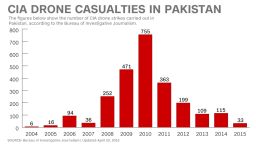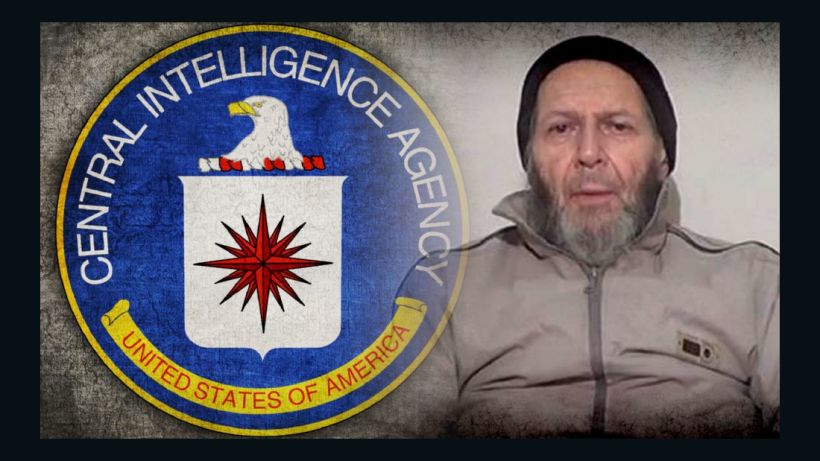The death of two innocent hostages — including one American — in a U.S. drone strike targeting al Qaeda is renewing the debate over the use of the controversial technology.
Drones are a central element of President Barack Obama’s counterterror strategy as the administration bets that sending the unmanned devices into places like Pakistan and Afghanistan poses fewer political and military risks than mobilizing ground troops. But the strategy has provoked a backlash from critics who say drones too often result in civilian casualties and are shrouded in secrecy.

Obama’s announcement on Thursday that a U.S. counterterrorism operation targeting an al Qaeda compound in January accidentally killed the hostages – American Warren Weinstein and Italian Giovanni Lo Porto – gave new perspective to the debate. Activist groups quickly called for increased transparency by the administration in how it carries out counterterrorism drone strikes.
“I think that it puts a lot of pressure on the U.S. government rationale of needing to keep things secret for national security purposes,” said Naureen Shah, the director of Amnesty International USA’s Security and Human Rights program. “It’s a win for people inside the administration who were fearful that they were leaving behind a legacy of secret global killings.”
READ: U.S. drone strike accidentally killed 2 hostages
The American Civil Liberties Union has filed multiple Freedom of Information Act lawsuits against the United States to obtain more data about the policies, strategies and victims of drone strikes. In a statement Jameel Jaffer, the group’s deputy legal director, said the president’s disclosure of the deaths raised “troubling questions about the reliability of the intelligence that the government is using to justify drone strikes.”
But the political response – so far – is notably subdued.
White House spokesman Josh Earnest defended the administration’s drone strategy.
“Our preference when dealing with suspected terrorists is to capture, detain, debrief and prosecute them,” he said. “But the fact is … in some areas of the world, particularly in remote locations where extremists are hiding out, local authorities have limited capacity and, in some cases, limited will to go after these extremists.”
He added: “We can’t conduct an Osama bin Laden-style raid against every terrorist.”
Kentucky Sen. Rand Paul, who is seeking the 2016 Republican presidential nomination, has railed against the administration’s use of drones. On Thursday, he simply said the unintended casualties were a “tragedy.”
Most other Republicans eyeing the White House didn’t address the drone debate on Thursday. Democratic presidential candidate Hillary Clinton, who was Obama’s first secretary of state, also remained quiet.
And on Capitol Hill, Republicans who are often critical of Obama’s foreign policy were hesitant to criticize the president or his use of drone technology to fight militant groups. Senate Intelligence Committee Chairman Richard Burr, a North Carolina Republican, said the killings did not raise questions about the use of drones in counterterrorism efforts.
“There are consequences to war and we’re in one,” Burr said. “We hate where there’s collateral damage. We hate when they’re Americans. But as proven by the president’s statement, we also killed two other Americans that were part of the terrorist organizations.”
Sen. Lindsey Graham, R-South Carolina, who serves on the Senate Committee on Armed Services and is considering a 2016 run agreed with Burr.
“You can’t stop the drone program because of this,” Graham said. “The hostages are innocent victims. I feel terrible for them, but we’re at war and we’ve got to keep prosecuting this war.”
READ: Could Warren Weinstein have been saved?
The top Democrat on the Senate Intelligence Committee, Sen. Dianne Feinstein of California, who has a led the committee to review the use of drone strikes, said in a statement on Thursday that more information on counterterrorism operations, including the number of civilian and non-civilian deaths, should be made public in an annual report.
In an interview in the Capitol, Feinstein said her committee had followed the program “very closely and very carefully,” and had conducted more than 50 oversight visits.
“We have been very impressed with the patience, with the targeting, with the skill which is very precise,” she said.
Rep. Bennie Thompson, the top Democrat on the House Homeland Security Committee acknowledged that “casualties happen.”
But “civilian casualties are a concern, whether they are American or native to the country where it’s being conducted,” he said. “That is a real concern.”
CNN’s Athena Jones, Ted Barrett and Deirdre Walsh contributed to this report.












